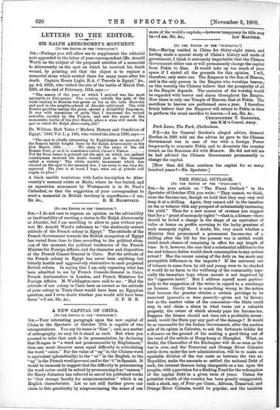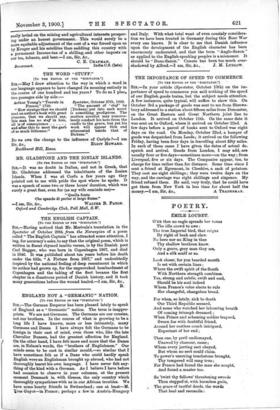THE FISCAL OUTLOOK.
[To THE EDITOR OP THE "SPECTATOR."] SIR,—In your article on "The Fiscal Outlook" in the Spectator of October 27th you write : "They cannot, we think, raise the Income-tax, though we hold that they may very well keep it at a shilling. Again, they cannot add to the taxation on tea or tobacco with any prospect of substantially increasing the yield." Then for a new source of revenue you suggest that for a" grant of monopoly rights "—that is, a license—there should be levied a charge in the shape of an equivalent of value or bonus on profits accruing to the lucky grantees of such monopoly rights. I doubt, Sir, very much whether a Ministry that pronounced a permanent Income-tax of a shilling after the bill for the present war is settled would stand much chance of remaining in office for any length of time. Is it, however, the case that a substantial addition to the tea and tobacco duties would check consumption to any serious extent ? Has the recent raising of the duty on tea made any perceptible difference in the imports ? If the universal use of tobacco in some form by old and young were to be checked it would do no harm to the wellbeing of the community, espe- cially the immature boys whose morale is not improved by the" cigarette habit." But I address myself more particu- larly to the suggestion of the writer in regard to a surcharge on licenses. Surely there is something wrong in the notion that because the grantee obtains a certain privilege to be exercised (guamdiu se bene gesserit)—given not by favour, but as the market value of the concession—the State could step in and claim a share in what turns out a valuable property, the owner of which already pays his Income-tax. Suppose the license should not turn out a profitable invest- ment, would the State pay any part of the damage ? It would be as reasonable for the Indian Government, after the auction sale of its opium in Calcutta, to ask the fortunate bidder for a clouceur on the ground of his making a good thing out of the vend of the article at Hong-kong or Shanghai. What, no doubt, the Chancellor of the Exchequer will do as soon as the war is over, and the Transvaal and Orange River Colonies settle down under the new administration, will be to make an equitable division of the war costs as between the two ex- Republics, make the amounts so settled the national Debt of each, the interest thereon being chargeable as a tax upon the peoples, with a provision for a Sinking Fund for the redemption of the capital Debt in a given term of years. Unless the potential wealth of the country has been greatly exaggerated, such a stock, say, of Four per Cents., African, Transvaal, and Orange River Colonies, would be popular, and the taxation easily levied on the Twining and agricultural interests prosper- ing under an honest government..- This would surely be a more equitable adjustment of the cost of a war forced upon us by Kruger and his satellites than saddling this country with a permanent Income-tax of a shilling, and other imposts on our tea, tobacco, and beer.—I am, Sir, &c., C. E. CHAPMAN,























































 Previous page
Previous page